Life Sciences News
See our Latest Journal Publications
NERC grant success for Prof Dave Scanlan
 Prof Dave Scanlan has been awarded £386,000 by NERC for his project on 'Revealing a mechanistic understanding of the role of viruses and host nutrient status in modulating CO2fixation in key marine phototrophs'. The research will be carried out in collaboration with Dr Andy Millard from Warwick Medical School, and colleagues at Plymouth Marine Laboratory, and focuses on understanding the impact of viral infection on marine photosynthesis, which has implications for ocean carbon cycling and climate change.
Prof Dave Scanlan has been awarded £386,000 by NERC for his project on 'Revealing a mechanistic understanding of the role of viruses and host nutrient status in modulating CO2fixation in key marine phototrophs'. The research will be carried out in collaboration with Dr Andy Millard from Warwick Medical School, and colleagues at Plymouth Marine Laboratory, and focuses on understanding the impact of viral infection on marine photosynthesis, which has implications for ocean carbon cycling and climate change.
Warwick extends synthetic biology collaborations with Brazil
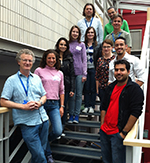 Katherine Denby, Vardis Ntoukakis and Patrick Schafer have been awarded £39,000 for establishing research collaborations between the plant synthetic biology group of Warwick Intregrative Synthetic Biology Centre (WISB) and the Biomass Systems and Synthetic Biology Center (BSSB) at the University of São Paulo.
Katherine Denby, Vardis Ntoukakis and Patrick Schafer have been awarded £39,000 for establishing research collaborations between the plant synthetic biology group of Warwick Intregrative Synthetic Biology Centre (WISB) and the Biomass Systems and Synthetic Biology Center (BSSB) at the University of São Paulo.
The funding from the Warwick–FAPESP Sprint scheme will fund a number of initiatives over two years, with the partnership lead on the Brazilian side by Prof Marie-Anne Van Sluys. Specific activities are planned to strengthen the collaboration and leverage additional research funding. We will build on the success of our Plant Synthetic Biology workshop at Warwick in September 2014 which was attended by 9 Brazilian PhD students and early career scientists, and run a second workshop in early 2016 with increased inclusion of synthetic biology engineering concepts. Two grant writing workshops will be held, one at Warwick and one in São Paulo, to develop proposals for EMBO and FAPESP funding for future Synthetic Biology workshops and joint applications for BBSRC-FAPESP research grant funding. Specific research exchanges by early career scientists and undergraduate students in both directions will build the collaboration at all levels.
IAS Fellowship success for PhD students
School of Life Sciences PhD students Max Newbert and Nicola Galley have been awarded Early Career Fellowships by the University of Warwick’s Institute of Advanced Study (IAS). The fellowships are designed to support Warwick doctoral candidates in the transition phase between their doctoral and postdoctoral careers. In addition to continuing research carried out during their PhD projects, Fellows have the opportunity to participate in collegiate and career development activities including leading a research-orientated workshop for other members of the IAS, assisting at the IAS-led Research Showcase events, and attending the weekly Academic Careers and Employment programme.
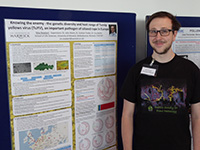 Max’s fellowship will focus on continuing and publishing research completed during the course of his BBSRC PhD studentship entitled 'The genetic diversity of Turnip yellows virus in oilseed rape (Brassica napus) in Europe, pathogenic determinants, new sources of resistance and host range'. Max’s studentship received extra funding from the Perry Foundation, a UK charity that promotes education and research connected with agriculture or food production for the benefit of the public. Turnip yellows virus (TuYV) is a major threat to oilseed rape and other brassicas reducing yields by up to 65%. Very high levels of virus have been detected in this year’s crop and there is evidence of 20-24% reduction in yield due to TuYV, from crops harvested so far. Max’s work has highlighted the prevalence of the virus in mainland Europe, identified isolates with novel host ranges and identified significant and new information on the phylogeny of the species, all of which are important for breeding resistant plant lines. The fellowship will be carried out at Wellesbourne under the supervision of Dr John Walsh.
Max’s fellowship will focus on continuing and publishing research completed during the course of his BBSRC PhD studentship entitled 'The genetic diversity of Turnip yellows virus in oilseed rape (Brassica napus) in Europe, pathogenic determinants, new sources of resistance and host range'. Max’s studentship received extra funding from the Perry Foundation, a UK charity that promotes education and research connected with agriculture or food production for the benefit of the public. Turnip yellows virus (TuYV) is a major threat to oilseed rape and other brassicas reducing yields by up to 65%. Very high levels of virus have been detected in this year’s crop and there is evidence of 20-24% reduction in yield due to TuYV, from crops harvested so far. Max’s work has highlighted the prevalence of the virus in mainland Europe, identified isolates with novel host ranges and identified significant and new information on the phylogeny of the species, all of which are important for breeding resistant plant lines. The fellowship will be carried out at Wellesbourne under the supervision of Dr John Walsh.
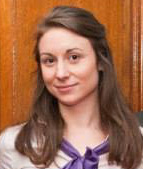 Nicola’s fellowship will build on research undertaken during her BBSRC PhD studentship on 'The role of species-specific modifications in peptidoglycan biosynthesis'. Antimicrobial Resistance (AMR) is a catastrophic threat to human health, dramatically reducing the effectiveness of drugs that we have come to rely on in common medical practice. It has been predicted that if resistance continues to grow at the same rate, 10 million people will die every year as a direct result of AMR infections by 2050. Understanding the bacterial cell wall and its main component, peptidoglycan, is vitally important in the development of new antimicrobials. Penicillin binding proteins (PBPs) are responsible for making peptidoglycan and are excellent targets for antimicrobial drugs as they are essential for cell viability. Nicola’s research identified a critical PBP substrate recognition phenomenon in Streptococcus pneumonia that has led to significant advances in understanding the cell wall synthesis process. During the fellowship Nicola aims to write several high-impact publications, present her research at international interdisciplinary conferences, and organise a symposium at Warwick on the topic of antimicrobial resistance. The fellowship will be carried out under the supervision of Dr David Roper and Prof Chris Dowson.
Nicola’s fellowship will build on research undertaken during her BBSRC PhD studentship on 'The role of species-specific modifications in peptidoglycan biosynthesis'. Antimicrobial Resistance (AMR) is a catastrophic threat to human health, dramatically reducing the effectiveness of drugs that we have come to rely on in common medical practice. It has been predicted that if resistance continues to grow at the same rate, 10 million people will die every year as a direct result of AMR infections by 2050. Understanding the bacterial cell wall and its main component, peptidoglycan, is vitally important in the development of new antimicrobials. Penicillin binding proteins (PBPs) are responsible for making peptidoglycan and are excellent targets for antimicrobial drugs as they are essential for cell viability. Nicola’s research identified a critical PBP substrate recognition phenomenon in Streptococcus pneumonia that has led to significant advances in understanding the cell wall synthesis process. During the fellowship Nicola aims to write several high-impact publications, present her research at international interdisciplinary conferences, and organise a symposium at Warwick on the topic of antimicrobial resistance. The fellowship will be carried out under the supervision of Dr David Roper and Prof Chris Dowson.
Congratulations to Max and Nicola on their success!
Dr Liz Fullam awarded Innovation Grant to combat antimicrobial resistance in TB
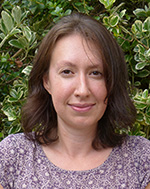 Dr Liz Fullam, a Wellcome Trust/Royal Society Sir Henry Dale Fellow in the School of Life Sciences, has been awarded a £237,000 Innovation Grant from the MRC and BBSRC’s Tackling Anti-Microbial Resistance (AMR) initiative. The award is in collaboration with Dr Matthew Gibson (Department of Chemistry) and is one of eight grants awarded in this round. The AMR initiative is a cross-Council call to drive forward innovative research in order to: understand the resistant bacterium at molecular, cell and community levels; understand the context of host/pathogen interactions in humans or animals; identify and validate novel targets (both host and bacterial) for new anti-bacterials; understand transmission of resistance in human or animal hosts.
Dr Liz Fullam, a Wellcome Trust/Royal Society Sir Henry Dale Fellow in the School of Life Sciences, has been awarded a £237,000 Innovation Grant from the MRC and BBSRC’s Tackling Anti-Microbial Resistance (AMR) initiative. The award is in collaboration with Dr Matthew Gibson (Department of Chemistry) and is one of eight grants awarded in this round. The AMR initiative is a cross-Council call to drive forward innovative research in order to: understand the resistant bacterium at molecular, cell and community levels; understand the context of host/pathogen interactions in humans or animals; identify and validate novel targets (both host and bacterial) for new anti-bacterials; understand transmission of resistance in human or animal hosts.
The two-year project will focus on Mycobacterium tuberculosis, one of the largest causes of mortality from a single infectious agent world-wide. The research groups of Dr Liz Fullam and Dr Matt Gibson will combine their expertise and utilise chemical biology to identify new therapeutics and diagnostics for this deadly pathogen.
Plant science collaboration with Brazil to improve vegetable crops
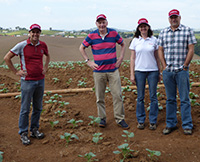 Dr John Walsh
Dr John Walsh , Associate Professor in the School of Life Sciences, and his collaborators have been awarded £15,000 for a research project on the characterisation of Potyviruses infecting vegetable crops in Brazil. The project was funded through the FAPESP SPRINT
, Associate Professor in the School of Life Sciences, and his collaborators have been awarded £15,000 for a research project on the characterisation of Potyviruses infecting vegetable crops in Brazil. The project was funded through the FAPESP SPRINT scheme (São Paulo Researchers in International Collaboration), which aims to encourage and promote the advancement of scientific research through partnerships between researchers in São Paulo State and overseas. The University of Warwick is one of only five UK institutions that has partnered with the São Paulo Research Foundation (FAPESP) to support this scheme.
scheme (São Paulo Researchers in International Collaboration), which aims to encourage and promote the advancement of scientific research through partnerships between researchers in São Paulo State and overseas. The University of Warwick is one of only five UK institutions that has partnered with the São Paulo Research Foundation (FAPESP) to support this scheme.
Dr Walsh’s project will be carried out in collaboration with Prof Elliot Kitajima from the University of São Paulo’s Department of Plant Pathology and Nematology in Piracicaba and Dr Marcelo Eiras from the Instituto Biologico in São Paulo. Initial activities to develop this partnership were supported by the University of Warwick’s Brazil Partnership Fund in 2014. The Brazilian operation of the commercial seed company Sakata are also involved in the research programme.
Potyviruses cause significant losses in agricultural, pastoral, horticultural and ornamental crops. This project focusses on Turnip mosaic virus (TuMV), which causes diseases in the economically important brassica family of crops including broccoli, cauliflower, cabbage, turnip and oilseed rape. Through determining the diversity of TuMV and investigating broad-spectrum resistance to the virus the team is expecting to identify naturally occurring resistance genes which can then be introduced into commercial crop lines. The collaboration brings together complementary expertise in plant science research which will lead to significant synergies and knowledge exchange, but also has the potential to generate substantial societal and economic benefits through collaboration with industry and the resulting exploitation of intellectual property.
Warwick students to present at MIT in international synthetic biology competition
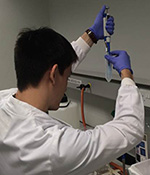 Undergraduate and newly graduated students from Warwick University will be travelling to MIT, Boston, this September 24-28 to compete in a global synthetic biology competition.
Undergraduate and newly graduated students from Warwick University will be travelling to MIT, Boston, this September 24-28 to compete in a global synthetic biology competition.
The team is interdisciplinary, with students from distinct academic fields bringing different skills and expertise to the table. These departments involve Maths, Physics, Engineering and Life Sciences, with Biomedical, Biochemical and Biological Sciences represented.
The team will be supported with advice from academic and research staff, including Prof Alfonso Jaramillo and Prof John McCarthy, among others, at the School of Life Sciences.
GARNish newsletter puts spotlight on plant science at Warwick
 The latest GARNish newsletter highlights plant science in Life Sciences, profiling the work of our academics.
The latest GARNish newsletter highlights plant science in Life Sciences, profiling the work of our academics.
'Plant science research at the University of Warwick is characterised by the breadth of expertise - from fundamental molecular mechanisms to projects with direct application to industry. We have world-class basic science in signalling, gene regulation, development, plant– environment (microbes, virus, soil) interactions, and evolution through to pest management, crop genetics and genomics underpinning the development of new varieties.'
Read the newsletter (pdf)
Warwick welcomes the next generation of scientists
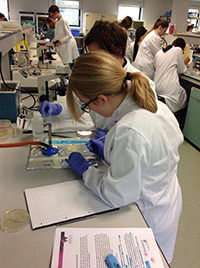 This week the School of Life Sciences welcomes the next generation of scientists from across the United Kingdom as part of a Headstart Summer School.
This week the School of Life Sciences welcomes the next generation of scientists from across the United Kingdom as part of a Headstart Summer School.
Taking place between the 19-23 July at the University’s Gibbet Hill campus, the Headstart Life Sciences course will provided the 17 year olds the opportunity to explore different biological disciplines taught within the School of Life Sciences and introduce them to a flavour of the academic side of undergraduate life.
Life Sciences Graduation - Class Prizes & Thesis Awards 2015

A large number of our graduates and their guests attended the School of Life Sciences Graduation Reception on Friday 17 July. Our Head of School, Laura Green, welcomed everyone on behalf of the School and many staff were on hand to greet and to congratulate their tutees.
We know better than anyone how much effort is needed to get a degree and congratulate everyone on their achievements this year.
New collaborative food systems learning programme funded by HEFCE
The University of Warwick is a partner in an exciting new initiative, the Innovative Food Systems Teaching and Learning (IFSTAL) programme, designed to improve post-graduate level knowledge and understanding of the food system. Through IFSTAL, students will be equipped with the knowledge, skills and opportunities needed for them to be more effective in the workplace. This will allow them to address the systemic failings in food systems which have resulted in about one billion people being hungry, two billion lacking sufficient nutrients, and over two billion overweight or obese.
With core funding from the Higher Education Funding Council for England (HEFCE), IFSTAL will bring together expertise and experience of faculty and students from five leading higher education institutions. Post-graduate students at these institutions, with an interest in ‘food systems’, will have the opportunity to participate and become part of the IFSTAL community.
Participating institutions are the University of Oxford (lead institution), City University-London, University of Reading, University of Warwick and the Leverhulme Centre for Integrative Research on Agriculture and Health (LCIRAH, comprising researchers from the Royal Veterinary College, the London School of Hygiene and Tropical Medicine, and the School of Oriental and African Studies).
Dr Liz Fullam discusses TB research at Buckingham Palace
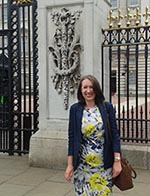 On 23rd June, Dr Liz Fullam was invited to Buckingham Palace for afternoon tea as a Sir Henry Dale fellow. The event, organised by the Royal Society, enabled newly appointed fellows to meet with his Royal Highness the Duke of York. HRH kindly hosted the event, giving him the opportunity to find out more about the research of some of our best young scientists. Liz met HRH and spoke about her work on tuberculosis (TB) and the importance of finding new drugs and diagnostics for this disease.
On 23rd June, Dr Liz Fullam was invited to Buckingham Palace for afternoon tea as a Sir Henry Dale fellow. The event, organised by the Royal Society, enabled newly appointed fellows to meet with his Royal Highness the Duke of York. HRH kindly hosted the event, giving him the opportunity to find out more about the research of some of our best young scientists. Liz met HRH and spoke about her work on tuberculosis (TB) and the importance of finding new drugs and diagnostics for this disease.
Nationwide oilseed rape survey indicates high levels of TuYV infection this season
 Results from a nationwide survey on oilseed rape indicate a high incidence of Turnip Yellows Virus (TuYV) in parts of England this year. Dr John Walsh, who led the research on behalf of seed breeder Limagrain UK, presented his findings at the Cereals 2015 event held in Lincolnshire 10 -11 June 2015.
Results from a nationwide survey on oilseed rape indicate a high incidence of Turnip Yellows Virus (TuYV) in parts of England this year. Dr John Walsh, who led the research on behalf of seed breeder Limagrain UK, presented his findings at the Cereals 2015 event held in Lincolnshire 10 -11 June 2015.
‘Levels of infection are much higher than they have been for the past few seasons, with crops in parts of Yorkshire as much as 92% infected. Generally these hotspots are where you would expect them to be due to the large areas of oilseed rape being grown locally.'
TuYV is thought to be the most damaging of all viruses transmitted in brassica crops, yet least understood. Carried by the peach-potato aphid, it results in yield losses and tipburn after storage. Dr Walsh believes that the high incidences of infection have come about as a result of the high numbers of aphids flying last year.
'Last winter was mild and there were high levels of peach-potato aphid, leading to very high levels of the virus.'
Changing perceptions of Britain from the Mesolithic to Neolithic age
 The Mesolithic-to-Neolithic transition marked a profound change in human society as a hunter-gatherer economy gave way to agriculture and the development of complex societies. In Northern Europe, this coincided with rising sea levels which cut Britain off from the continental mainland.
The Mesolithic-to-Neolithic transition marked a profound change in human society as a hunter-gatherer economy gave way to agriculture and the development of complex societies. In Northern Europe, this coincided with rising sea levels which cut Britain off from the continental mainland.
Professor Robin Allaby explains his new research which challenges the traditional evaluation of the development of early British man.
An interview with Virologist Prof David Evans: What do we know about Ebola?
 The Ebola outbreak in West Africa has rapidly become the deadliest since the discovery of the virus. But what do we really know about this deadly disease? Ahead of his Cheltenham Science Festival lecture at the Winton Crucible on Thursday 4th June, Virologist Professor David Evans explores a little of the history and biology of Ebola.
The Ebola outbreak in West Africa has rapidly become the deadliest since the discovery of the virus. But what do we really know about this deadly disease? Ahead of his Cheltenham Science Festival lecture at the Winton Crucible on Thursday 4th June, Virologist Professor David Evans explores a little of the history and biology of Ebola.
Researchers have been awarded over £1.3m to research food security
Researchers from the University of Warwick’s School of Life Sciences (SLS) have been awarded over £1.36m in grants to further their work into food security.
The BBSRC Horticulture and Potato Initiative (HAPI) grants include substantial cash and in-kind contributions from industrial partners and will be used to support work into how to improve pest and disease control and post-harvest quality.
Commenting on the grants Professor Laura Green, Head of SLS, said:
“The BBSRC HAPI grants will help ensure that the University of Warwick’s School Life Sciences continues to play a leading role in improving food production globally. The Warwick HAPI-funded projects will result in substantial impacts on the horticulture industry by translating research findings into solutions that benefit several stages in the food supply chain, including farmers, processors and retailers.”
Prof Michael VanNieuwenhze joins Life Sciences as an IAS Visiting Fellow
The School of Life Sciences is pleased to welcome Prof Michael VanNieuwenhze , Associate Professor in the Department of Chemistry at Indiana University. Prof VanNieuwenhze, an expert in peptide antibiotics and bacterial cell wall biosynthesis, will spend eight weeks at Warwick as an IAS Visiting Fellow
, Associate Professor in the Department of Chemistry at Indiana University. Prof VanNieuwenhze, an expert in peptide antibiotics and bacterial cell wall biosynthesis, will spend eight weeks at Warwick as an IAS Visiting Fellow , hosted by Dr David Roper
, hosted by Dr David Roper (Life Sciences) and Prof Tim Bugg
(Life Sciences) and Prof Tim Bugg (Chemistry).
(Chemistry).
During the Fellowship Prof VanNieuwenhze will spend time with researchers at Warwick, sharing his knowledge of methods and techniques and participating in a series of lectures and workshops, which will also involve academics from other institutions. His expertise will provide great synergy with members of the research community at Warwick, enabling the consolidation of existing collaborations and the initiation of new partnerships to drive forward research in the globally important area of antimicrobials.
Researchers secure £3.19m boost to tackle superbugs
Life Sciences researchers have been awarded £3.19m in funding to support a flagship project into antimicrobial resistance (AMR).
The funding will enable multi-partner collaborations in order to tackle the growing threat of superbugs as part of a co-ordinated multi-disciplinary effort to fight their prevalence.
Awarded by a cross research council ‘war cabinet’ on AMR comprising the Medical Research Council (MRC) and the Biological Sciences Research Council (BBSRC), the funding marks one of the largest UK public grant investments in AMR research.
Researchers Prof Chris Dowson, Dr David Roper, Dr Adrian Lloyd from the School of Life Sciences and Prof Matthew Turner of the Department of Physics, will investigate a vital link in the chain of antimicrobial resistance – the bacterial cell wall. The main component of the wall is called peptidoglycan, which is the key target of penicillin and other similar antibiotics.
School of Life Sciences in Brussels for Warwick's 50th Anniversary Celebrations
The University of Warwick is running an exciting programme of research-led events in 2015 as part of its 50th anniversary celebrations.
Members of the School of Life Sciences will be taking part in events in Brussels in the week beginning 8th June as part of these celebrations focusing on:
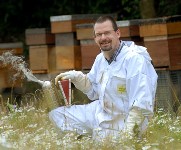 Bee health
Bee health
The European honeybee is the world's most important commercially-managed pollinator. Its associated pests and pathogens are becoming increasingly worrying factors that have seen the decline of honeybee stocks, causing concern about the future availability of honeybee pollination.
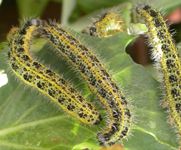 Sustainable use of pesticides
Sustainable use of pesticides
The tools that are available to farmers and growers to implement sustainable use of pesticides in a way that is practical and viable economically.
Nick Dale, Professor of Neuroscience awarded £755,273 from BBSRC for his project 'Amino acid sensing by hypothalamic tanycytes'
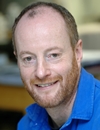 Nick Dale, Professor of Neuroscience in the School of Life Sciences, has been awarded £755,273 from BBSRC for his project on ‘Amino acid sensing by hypothalamic tanycytes’.
Nick Dale, Professor of Neuroscience in the School of Life Sciences, has been awarded £755,273 from BBSRC for his project on ‘Amino acid sensing by hypothalamic tanycytes’.
The research will focus on specialised cells known as tanycytes, which play a crucial role in detecting the levels of important metabolites such as amino acids and glucose in the brain.
This sensing mechanism helps the brain to regulate the balance between energy storage and expenditure, leading to the gain and loss of body weight, so understanding the biological factors involved in these processes could lead to major impacts on health and wellbeing.
First UK Autophagy Network Meeting held at Warwick and hosted by the School of Life Sciences
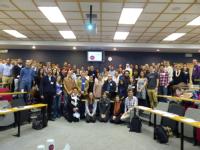 On the 6th & 7th May the University of Warwick held a highly successful first UK Autophagy Network Meeting entitled Autophagy in Health and Disease.
On the 6th & 7th May the University of Warwick held a highly successful first UK Autophagy Network Meeting entitled Autophagy in Health and Disease.
The symposium was organised by Dr Ioannis Nezis of the School of Life Sciences and Professor Sharon Tooze from The Francis Crick Institute and was generously sponsored by the Company of Biologists, British Society for Cell Biology, Science AAAS, Abcam Plc, Enzo Life Sciences and Abgent Ltd.
The delegates discussed the latest advances in Autophagy Research, from basic molecular and cellular mechanisms to pathophysiology of diseases such as cancer, neurodegeneration and other ageing-related diseases, studied in several model organisms (yeast, fruit flies and mice). The programme also included two poster sessions.
A number of collaborations are planned as a result of the meeting, and plans are already in place for a second meeting, possibly in Edinburgh next year.
Around 100 delegates attended from across the UK, including two overseas speakers, Professor Tom Neufeld (University of Minnesota, USA) and Professor Terje Johansen (University of Tromso, Norway).
Other invited UK speakers were Professor David Rubinsztein (University of Cambridge), Professor Katja Simon (University of Oxford), Dr Ian Ganley (University of Dundee), Dr Oliver Florey (Babraham Institute, Cambridge), Dr Rupert Beale (University of Cambridge), Dr Stephanie Kermorgant (Queen Mary University), Dr Sovan Sarkar (University of Birmingham), Dr Michelangelo Campanella (The Royal Veterinary College, University of London), Dr Niccolo Pengo (UCL) and Dr Elaine Dunlop (Cardiff University).
